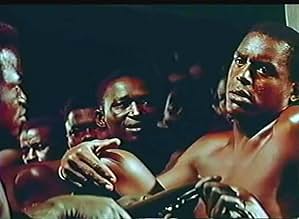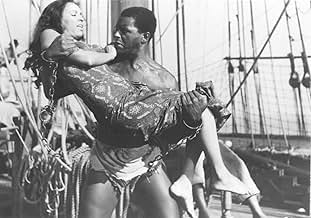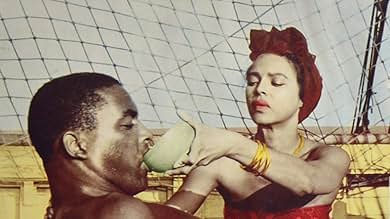Agrega una trama en tu idiomaA Dutch slave captain, on a voyage to Cuba, faces a revolt fomented by a newly captured African slave, Tamango. The slaves capture the captain's mistress, forcing a showdown.A Dutch slave captain, on a voyage to Cuba, faces a revolt fomented by a newly captured African slave, Tamango. The slaves capture the captain's mistress, forcing a showdown.A Dutch slave captain, on a voyage to Cuba, faces a revolt fomented by a newly captured African slave, Tamango. The slaves capture the captain's mistress, forcing a showdown.
- Dirección
- Guionistas
- Elenco
Opiniones destacadas
I was quite impressed with this film, mostly for the incredible strides forward it made in portraying the horrors of the slave trade and horrific abuse of the kidnapped and enslaved Africans. The epic miniseries Roots, two decades later, and Spielberg's Amistad some 40 years after this film offer more detail and arguably higher production values, but Tamango is well worth watching, especially for those keen on either film or world history. Like another reviewer, I found the acting a little flat, despite the presence of the talented Curd Jurgens and Dorothy Dandridge. But the performances of all were engaging enough for me to want to stick with it to see the resolution of the conflicts. I was also very impressed to see the relationship between CJ's and DD's characters, at a time in the US when white mobs were trying to prevent children of different colors from going to school together, and a decade before the US Loving case forced states to accept marriages between people of different colors.
Captain Reiker (Curd Jürgens) loads a new shipment of slaves destine for Cuba. Tamango (Alex Cressan), the lion hunter, tries to lead a revolt but most slaves are only farmers. Aiché (Dorothy Dandridge) is a slave owned by the Captain. Doctor Corot (Jean Servais) is a Frenchman conflicted about slavery.
It's a black empowerment movie. There is a fascinating scene with Reiker haggling with the chief over his payment. The actors are all terrific. I do question about escaping into the cargo hold. If there are fewer escaped slaves, then a quick retreat may make more sense. While the final ending makes poetic sense, it's not the most action-filled possible. Aiché is still great and her decision is extremely powerful. The most impressive part may be when this movie was released. It's in the era of Sydney Poitier, the heroic but non-threatening black. This is different and that's great.
It's a black empowerment movie. There is a fascinating scene with Reiker haggling with the chief over his payment. The actors are all terrific. I do question about escaping into the cargo hold. If there are fewer escaped slaves, then a quick retreat may make more sense. While the final ending makes poetic sense, it's not the most action-filled possible. Aiché is still great and her decision is extremely powerful. The most impressive part may be when this movie was released. It's in the era of Sydney Poitier, the heroic but non-threatening black. This is different and that's great.
The precedent user is right:it's based on a famous short story from Prosper Mérimée.It's strange that the writer's name does not appear in the credits on the IMDb page.Dorothy Dandrige had already been in "Carmen Jones " ,a Bizet opera based on another famous short story by...Prosper Mérimée.
"Tamango" was a failure when it was released and during the sixties,John Berry ,who had made a film noir chef d'oeuvre in the fifties ,"He ran all the way" was relegated to direct French pop star Johnny Hallyday in a forgotten turkey "A Tout Casser" .
"Tamango" is a well-made movie but it is icily impersonal.Aisha's character's evolution is predictable.On the other hand ,there's a good use of the wide screen (cinemascope ) particularly effective when it comes to depict the hold where the slaves cram.The documentary side is the most successful,and "Tamango" can be looked upon as the granddaddy of the "Roots " series in the seventies.Tamango himself is close to Kunta in that 1977 Marvin Chomsky's work.
"Tamango" was a failure when it was released and during the sixties,John Berry ,who had made a film noir chef d'oeuvre in the fifties ,"He ran all the way" was relegated to direct French pop star Johnny Hallyday in a forgotten turkey "A Tout Casser" .
"Tamango" is a well-made movie but it is icily impersonal.Aisha's character's evolution is predictable.On the other hand ,there's a good use of the wide screen (cinemascope ) particularly effective when it comes to depict the hold where the slaves cram.The documentary side is the most successful,and "Tamango" can be looked upon as the granddaddy of the "Roots " series in the seventies.Tamango himself is close to Kunta in that 1977 Marvin Chomsky's work.
"Tamango" is a film which surprised me, as I didn't expect to see such a strong film back in 1958. After all, in some parts of the USA, even in 1958, they would have hesitated to show a film where black men fight and kill their oppressors. It's a shame, as it's a dandy film.
The story begins in West Africa. A tribe is selling their conquered foes to a Dutch slaver (Curd Jurgens). However, among the slaves is a warrior...who also is a charismatic leader. He's determined NOT to make it to where ever the boat is headed and he insists on freeing himself from bondage. Eventually, he and his co-conspirators rise up against the crew and fight for their freedom.
The film is not perfect. I think it actually made the slave ship seem NICE compared to how hellish such boats often were. The same with the cruelty. While severe, I am sure many slave ships treated their 'cargo' much worse. But on the other hand, it's a strong indictment against this evil and is a great film about the human spirit. Well worth seeing...even if the ending is a bit weak.
The story begins in West Africa. A tribe is selling their conquered foes to a Dutch slaver (Curd Jurgens). However, among the slaves is a warrior...who also is a charismatic leader. He's determined NOT to make it to where ever the boat is headed and he insists on freeing himself from bondage. Eventually, he and his co-conspirators rise up against the crew and fight for their freedom.
The film is not perfect. I think it actually made the slave ship seem NICE compared to how hellish such boats often were. The same with the cruelty. While severe, I am sure many slave ships treated their 'cargo' much worse. But on the other hand, it's a strong indictment against this evil and is a great film about the human spirit. Well worth seeing...even if the ending is a bit weak.
A movie that, in 1958, at last began to approach the real horror of slavery, and gives us a suspenseful story besides. A group of Africans is taken aboard a Dutch slave ship in 1820, and their leader, Tamango (Alex Cressan) begins planning a rebellion, at first rather quietly, with what is practically civil disobedience - not eating the food. The film does a fantastic job at humanizing the Africans, and we see their reactions to be what any other captive group's would be, covering a wide range - despair, fear, submission, bravery, and intelligent scheming. We see the outright cruelty on the part of the slavers - throwing a man overboard to make an example to the group, hanging another, and leaving Tamango out in the sun as punishment - but to director John Berry's credit, it's not overdone, and we see the human side of these people as well, in their conversations and little moments. Far more insidious is the pervading view of racial superiority, so that underneath what is apparent civility is a monster, one that views others as property, and of no more value than that.
To those who cringe because Dorothy Dandridge is a "mistress" or is involved in an "interracial romance" because they believe it takes away from the central message of the film, I ask that you look again - she's a slave, owned by the captain of the ship, and forced to have sex with him. She makes what she really thinks of him very clear when he dupes her into thinking he's written out orders for her freedom. I think it does the film a disservice to see her involvement with the man as willing, and it does Dandridge one as well, since the actress fought for changes to the script to make this point clear. It's ironic that the miscegenation that got the film banned by conservatives in the United States upon its release in France, is today decried by liberals as a weakness, when neither group seem to fully recognize the main point of the film, and what Dandridge's (admittedly conflicted) role was.
With that said, there is something a little off about the film as a whole - probably the dialogue, which seems a little stilted at times (even allowing it the shortcut of not showing the usage of translators between languages, and has everyone speaking English). The acting itself is fine, and it's well cast. It's a shame that this was Alex Cressan's only performance, because he has such strong presence. Dandridge was at the height of her powers, and while that sadly had very little roles coming her way even after her fantastic performance four years earlier in 'Carmen Jones', she's a joy to behold here. Curd Jürgens is great as well as the captain, and the staging about the ship is reasonably realistic as well.
If you look at a list of films which portray slavery sorted by year, you'll see 'Tamango' is one of the earliest to show it honestly, and for that, it deserves respect. The film feels ahead of its time, and I admire blacklisted director John Berry's courage. He went to Europe and made a film that certainly didn't make him more loved in America because of its scenes with Dandridge and Jürgens kissing, and because of its realistic portrayal of slavery - something Hollywood and America were still having a hard time coming to terms with. Not perfect, but a very good film, and deserves to be better known.
To those who cringe because Dorothy Dandridge is a "mistress" or is involved in an "interracial romance" because they believe it takes away from the central message of the film, I ask that you look again - she's a slave, owned by the captain of the ship, and forced to have sex with him. She makes what she really thinks of him very clear when he dupes her into thinking he's written out orders for her freedom. I think it does the film a disservice to see her involvement with the man as willing, and it does Dandridge one as well, since the actress fought for changes to the script to make this point clear. It's ironic that the miscegenation that got the film banned by conservatives in the United States upon its release in France, is today decried by liberals as a weakness, when neither group seem to fully recognize the main point of the film, and what Dandridge's (admittedly conflicted) role was.
With that said, there is something a little off about the film as a whole - probably the dialogue, which seems a little stilted at times (even allowing it the shortcut of not showing the usage of translators between languages, and has everyone speaking English). The acting itself is fine, and it's well cast. It's a shame that this was Alex Cressan's only performance, because he has such strong presence. Dandridge was at the height of her powers, and while that sadly had very little roles coming her way even after her fantastic performance four years earlier in 'Carmen Jones', she's a joy to behold here. Curd Jürgens is great as well as the captain, and the staging about the ship is reasonably realistic as well.
If you look at a list of films which portray slavery sorted by year, you'll see 'Tamango' is one of the earliest to show it honestly, and for that, it deserves respect. The film feels ahead of its time, and I admire blacklisted director John Berry's courage. He went to Europe and made a film that certainly didn't make him more loved in America because of its scenes with Dandridge and Jürgens kissing, and because of its realistic portrayal of slavery - something Hollywood and America were still having a hard time coming to terms with. Not perfect, but a very good film, and deserves to be better known.
¿Sabías que…?
- TriviaAt initial release, depiction of interracial romance caused the film to be banned in the United States and in the French colonies.
- ConexionesFeatured in Biography: Dorothy Dandridge: Little Girl Lost (1999)
Selecciones populares
Inicia sesión para calificar y agrega a la lista de videos para obtener recomendaciones personalizadas
- How long is Tamango?Con tecnología de Alexa
Detalles
- Fecha de lanzamiento
- Países de origen
- Idioma
- También se conoce como
- Die schwarze Sklavin
- Locaciones de filmación
- Productoras
- Ver más créditos de la compañía en IMDbPro
- Tiempo de ejecución
- 1h 44min(104 min)
- Relación de aspecto
- 2.35 : 1
Contribuir a esta página
Sugiere una edición o agrega el contenido que falta
















